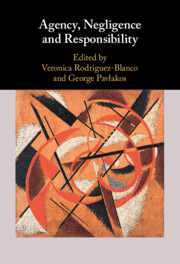Book contents
- Agency, Negligence and Responsibility
- Agency, Negligence and Responsibility
- Copyright page
- Dedication
- Contents
- Figures
- Contributors
- Acknowledgements
- Introduction
- Part I Will and Blameworthiness
- Part II Agency, Reasons and Inadvertence
- Chapter 5 The Possibility of Pure Negligence
- Chapter 6 Agent-Relativity without Control
- Chapter 7 The Boundaries of Negligence
- Chapter 8 The Backward-Looking Puzzle of Responsibility in Negligence
- Chapter 9 Responsibility and Agency
- Part III The Significance of Action in Negligence
- Bibliography
- Index
Chapter 7 - The Boundaries of Negligence
from Part II - Agency, Reasons and Inadvertence
Published online by Cambridge University Press: 28 October 2021
- Agency, Negligence and Responsibility
- Agency, Negligence and Responsibility
- Copyright page
- Dedication
- Contents
- Figures
- Contributors
- Acknowledgements
- Introduction
- Part I Will and Blameworthiness
- Part II Agency, Reasons and Inadvertence
- Chapter 5 The Possibility of Pure Negligence
- Chapter 6 Agent-Relativity without Control
- Chapter 7 The Boundaries of Negligence
- Chapter 8 The Backward-Looking Puzzle of Responsibility in Negligence
- Chapter 9 Responsibility and Agency
- Part III The Significance of Action in Negligence
- Bibliography
- Index
Summary
This chapter defends three ideas. (1) That negligence is essentially a conative failure to exercise due care. The negligent agent doesn’t care enough about a relevant moral aim. (2) Resultantly, the potential cognitive failures of agents, whether they foresee or fail to foresee certain risks of harm, are only incidentally relevant to their negligence. In this way, (3) negligence is conceptually contiguous with recklessness. The hallmark of both reckless and negligence conduct is an insufficient regard for the legitimate interests of others, and what separates them is better understood in terms of conative differences in how each agent disregards those interests, rather than cognitive differences in advertence. I examine these claims in the context of a puzzle regarding negligence and foresight, and consider the implications of my conclusions for negligence culpability in morality and the traditional hierarchy of mens rea in the law.
Keywords
- Type
- Chapter
- Information
- Agency, Negligence and Responsibility , pp. 136 - 153Publisher: Cambridge University PressPrint publication year: 2021
- 1
- Cited by



